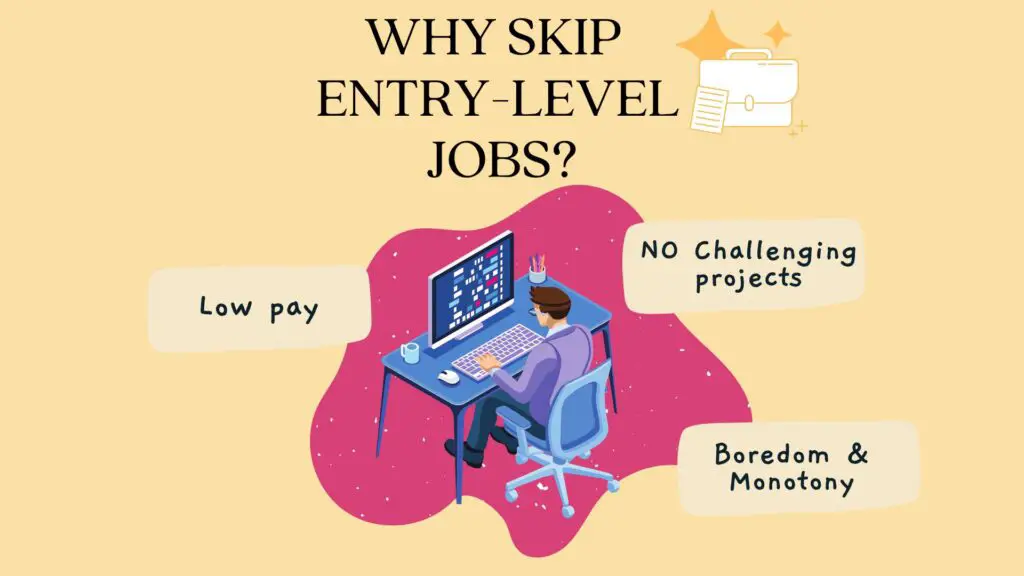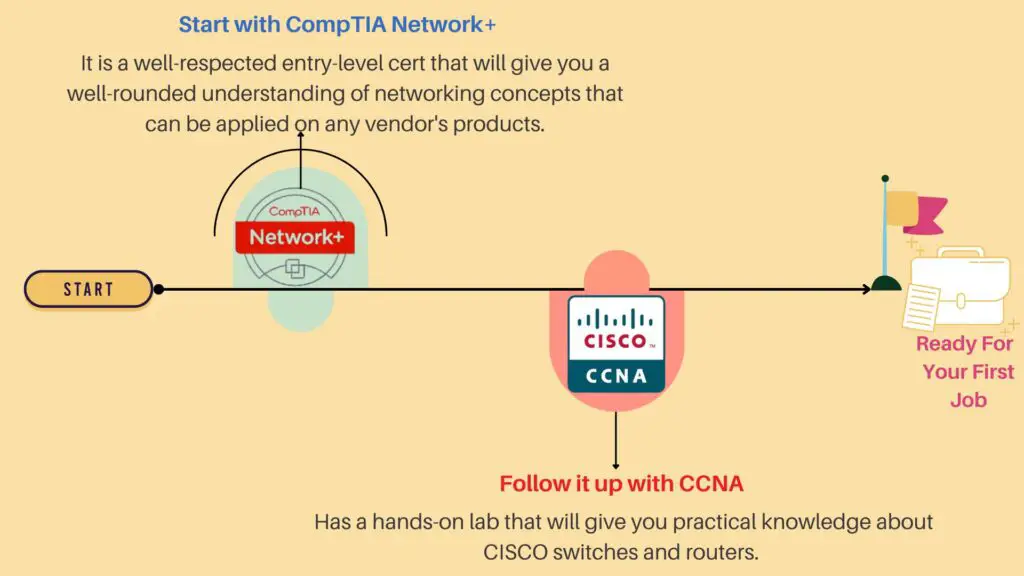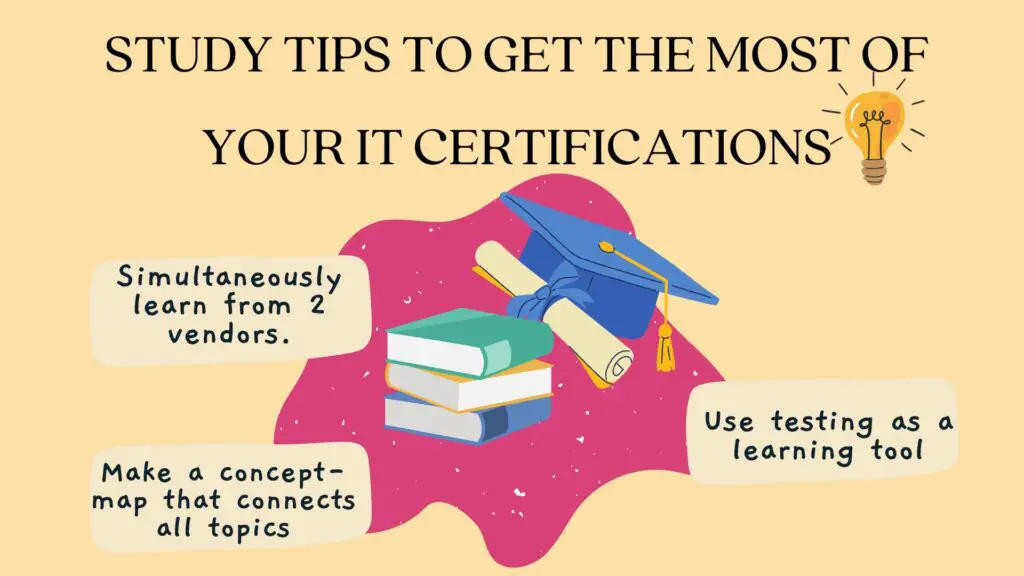I know how hard and confusing it can be to figure out which IT certification to get first, especially if you are just starting your IT career or are thinking about making a career change.
Get the CompTIA Network+ certification first. After that, take Cisco's CCNA. These two certifications will give you a solid foundation as well as hand's-on training, allowing you to enter the IT field without having to start at an entry-level position like help desk or field services technician.
That's not to say there's anything wrong with entry-level jobs; however, if you want to advance quickly in the IT field, you can be strategic about the certifications you obtain and skip a few steps.

The #1 Reason You Need a Strategic Plan for Your IT Career
Humans are good at being strategic.
Perhaps the most striking example comes from computer vs humans in chess.
A while back, Hydra, the world's most advanced supercomputer at the time, was the first to beat the best human chess player in the world.
But, there’s a coda to that story that’s often forgotten.
In freestyle chess, where human players have to just focus on being strategic, and not on memorizing the tactical moves of chess, humans beat the giant Hydra and left it in the dust.
The moral of the story is that strategy is what humans are innately good at.
Being strategic is about understanding the big-picture of the game, managing the small battles so you can win the big ones.
It's about planning out the steps you take to get to your desired destination such that you get there the quickest and with the least amount of time and money spent.
In your case, the desired destination is having a successful IT career. Having a good-paying job that allows you to impact the world in the way you want to.
The steps you take are the IT certs you get, the jobs you apply for, and the experience you gain.
The first IT certifications you get, set the tone for the rest of your career, and, in a roundabout way, decide how long it will take you to land a well-paying position that gives you the freedom to make an effect in the world. To a certain degree, they affect how fast your IT career develops.
Most newcomers are usually inundated with advice from well-meaning friends and family. " You need to start at the bottom and work your way up."
As a result, they follow the advice and start their IT careers by first getting an entry-level IT certification and then using that to score entry-level jobs**.**
This is the most common and least effective path.
There are several compelling reasons why you might want to think twice before starting your IT career with an entry-level job.

Benefits of skipping entry-level-jobs
Case Against Starting Your Career With Entry-Level Jobs
In brevity:
You might be stuck there for a while
Low pay
Boredom and monotony
IT entry-level jobs are, well, entry-level.
Many are repetitive and require little skill or creativity. In many organizations, entry-level employees are often seen as expendable- meaning they're often given tasks no one wants to do or that take away from more important work.
As a result, instead of gaining the valuable experience, they were hoping for, many entry-level employees find themselves doing busy work.
There's also a good chance you'll be stuck in that position for quite some time. Most companies are often hesitant to invest in employee development, preferring to hire someone who already has the skills they need.
And, it's also no secret that with an entry-level IT job, you're at the bottom of the totem pole. You're paid relatively little. And if you're working for long hours for little pay, it can be easy to start questioning whether or not your IT career is even worth it.
Remember, the long talk we had about being strategic? This is where it comes into play.
Starting your career with an entry-level job is only going to slow you down. If you want to quickly advance in your IT career, you need to be strategic about the certifications you get and the jobs you apply for.
Even when you are a beginner want a job that is challenging and that positions you to get the most out of the experience and leverage it for future opportunities.
In other words, you want a job that is not entry-level.
Advantages of Skipping Entry-Level Jobs
You are paid more, so you can save more money faster to use to obtain more certificates, which will help you quickly advance up the IT career ladder.
You get more interesting projects to work on, which can help you learn new technologies faster, as opposed to entry-level jobs with repetitive tasks.
You collaborate with other experienced professionals who can mentor you and assist you in learning faster.
The problem is that most employers require 1-2 years of experience for non-entry level jobs.
So, how do you get around this? How can you get a non-entry level job without any experience?
You can do this by getting certifications that allow you to apply for non-entry level jobs, even if you are just a beginner.

IT certification path for beginners
What IT Certifications To Get First As A Beginner?
The ultimate goal is to get the appropriate knowledge and then a high-paying job that matches your interest and how you want to impact the world.
To get there as quickly as possible, get IT certificates that allow you to avoid entry-level jobs even if you are a beginner.
Here are two certifications to get you started on the right foot:
1) CompTIA Network+:
This is a great entry-level cert that covers the basics of networking.
It is vendor neutral, which means it will give you a well-rounded understanding of networking concepts that can be applied to any vendor's products.
CompTIA Network+ is a well-respected certificate in the IT industry, and it covers a broad range of topics, such as network protocols, network attenuation, network address translation and ad hoc networks. It also covers the Internet of Things (IoT), cloud computing, and virtual devices.
After completing your CompTIA Network+ course, you will know the following:
Networking protocols and ports, and protocol types
Installing, managing, and configuring wired and wireless networks.
Usage of routers, switches, segmentation, and subnets for network traffic management
Open Systems Interconnection (OSI) model and layer competence.
Network testing, troubleshooting, and security fundamentals, amongst other topics.
What you should know about the CompTIA Network+ certification exam :
Using official CompTIA study materials will help ensure you pass your exam.
It consists of 90 questions in 90 minutes.
You need a passing score of 720, on a scale of 100-900.
Exam is around $338 USD (see all pricing).
After getting their CompTIA network+ certification, many newcomers feel like they have to start looking for entry-level jobs right away. This is how they get started in IT.
But there is a different way to do it. A way to get jobs that are not entry level even if you are just starting out.
CompTIA Network+ certification is a good way to learn about IT when you are just starting out, but it's not a good way to introduce yourself to the IT job market. It screams "beginner" all over it.
Instead, think of the CompTIA Network+ certification as proof that you understand networking. Then, get the CCNA certification and use that to apply for your first job. This is a better way to jump start your IT career.
Note: The CompTIA Network+ teaches you the fundamentals of networking, so if you have a bachelor's degree in IT, you can skip the Network+ and go straight to the CCNA.
Second, if you're strapped for cash and can't afford both certs, but are determined enough, study the CompTIA Network+ study material but skip the exam. Pay only for the CCNA.
2) Cisco Certified Network Associate (CCNA):
CCNA is a midrange level cert that gives practical knowledge that covers the basics of Cisco routers and switches.
Topics covered in the CCNA include:
Network access
IP connectivity
IP services
Infrastructure security
Automation and programmability
CCNA training has a hands-on lab component where you learn how to install, operate, configure, and verify basic IPv4 and IPv6 networks.
Here are some of the non-entry level jobs you can get with CCNA cert even if you are a beginner:
| Job | Salary / Year |
| Network Analyst | $ 60 000 - $70 000 |
| Network System Admin | $ 65 000 - $ 84 000 |
| Network Support | $ 51 000 - $66 000 |
| IT specialist | $ 34 000 - $55 000 |
| NOC Admin | $ 65 000 - $73 000 |
Benefits of IT Certifications For Your New IT Career
Why get certified? One survey shows that about 92% of IT professionals hold at least one certification.
There are many reasons why IT certification is worth the time and effort required for training:
1)Better job prospects: Most HR departments use software that tracks the keywords in resumes. IT certifications help your resume stand out and get noticed by these applicant tracking systems (ATS).
2) Boost Your Confidence: Getting certified gives you a sense of accomplishment and can help build your confidence, especially when you are just starting out in your IT career.
3) Develop In-Demand Skills: Keeping up with the latest trends can be difficult with technology constantly changing. IT certifications help ensure that you have the skills that employers want.

Study tips to ace your IT certification exam
3 Tips to Getting the Most Out of your IT Certification
Now that you are clear about which IT certs to start with, actually studying for and passing the exam can be a challenge in itself.
Here three tips you can include in your exam preparation strategy:
- Find two good vendors from whom you can learn concurrently
This lets you compare and contrast the information, and there's a chance that one vendor will explain one concept better than the other, or that another will cover a topic that the first missed.
So studying from both vendors will give you a comprehensive understanding that will help you in passing your first IT certification exam.
The two trainers I recommend are the Network Engineer Academy and Cisco CCNA prep by Greg Sowell on LinkedIn Learning.
2. Create a scope or tree diagram
Once you've chosen your vendors, make a scope or tree diagram that maps all of the topics you need to study. This will help you see where each specific concept fits in the big picture and give you a better understanding of how all the pieces fit together.
As you study, use color codes to mark which topics you understand and which ones you need more help with.
This will help you focus your efforts when you're revising on the areas that need the most work.
3. Use testing as a tool while learning
Testing yourself as you go is one of the best ways to learn. Make it a habit to ask yourself what you understand about a topic before beginning to study it.
Also, once you think you understand the material well, give yourself a quiz after a few days.
We tend to retain information longer when there is an element of struggle involved in the learning process.
So testing yourself not only allows you to check for understanding, but also helps embed the material in your long-term memory.
How To Get The Most Of Your First IT Job
Getting your first IT job can be an exciting experience, but it is common to feel unsure of what to do next.
To make the most of this opportunity, you must explore the various career paths available in the field and identify those that truly interest you.
Do you wish to work as a cloud engineer? Do you want to work as a network engineer? Do you want to learn about ethical hacking? Do you aspire to be a programmer?
Do some research on the current state of the IT industry. This can involve looking at different job postings, talking with other IT professionals to figure out what skills are needed in the industry.
All of this will help you better identify which positions and certifications are likely to provide the best opportunities for future career growth.
Once that's established, it is time to start taking action. Whether that means pursuing additional certifications or building up relevant work experience. This is how you can truly thrive in your first IT job – and beyond!